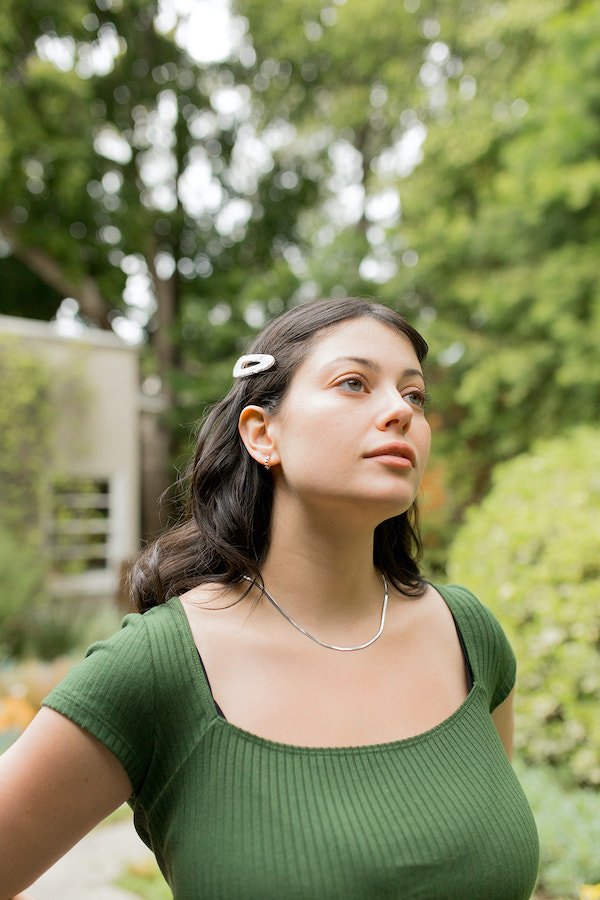
How I Knew It Was Time For Me To Go On Antidepressants (And Off Them, Too)
The following story is one writer’s account of going on and off of antidepressants. The Good Trade does not offer medical advice and any decisions regarding medication or treatment for mental health should be discussed with your doctor.
I remember the day like it was yesterday. It was October 2018 and I was on my way home after a work trip. A mental darkness engulfed me, threatening to swallow me whole.
“I had learned to be well versed in pretending I was okay.”
The last time the darkness had been that forceful was nine years earlier, and my doctor had recommended antidepressants. But I refused. Antidepressants weren’t an option for me. It wasn’t something my religious environment would condone or something that would’ve been encouraged culturally. Surely, I would be okay if I just prayed.
Yet here I was, nine years later, and the darkness had hit me with a force stronger than ever before. I didn’t understand. I had done all the right things. I had been in and out of therapy for years, confronting past trauma. I was doing the work. I had a journaling practice and was meditating. I had great friends and an active social life. How was I here again?
The day after I got back from my work trip, I woke up and started crying before my eyes had even opened properly, and it wouldn’t stop. I had a therapy session scheduled that day, and it was also my turn to deliver a meal to a friend who had just given birth. I was determined to bring it to her. Strange, isn’t it? How, in the face of this darkness, I didn’t want to let anyone down. I had made a promise, and I was going to keep it. I was a provider, a nurturer, a strong Black woman. I cooked in tears. I was a mess. But I refused to accept that I needed help.
“In the face of this darkness, I didn’t want to let anyone down.”
When I got to my session, I unraveled. In therapy, you can’t really look away. I was scared and hurting. I was afraid that I had let it go too far this time, that I wasn’t going to be able to claw myself back out of the darkness. My therapist referred me to my doctor for an emergency appointment. She said I was out of control and that I couldn’t be trusted not to harm myself. It felt strange to hear her say I was a risk to myself. But it was also a relief because I had known this, but I couldn’t admit it without her help.
The next couple of weeks were a blur. I called in sick at work and waited for my appointment with the doctor. When the day came, the experience wasn’t as scary as I’d thought it would be. My doctor asked questions, listened, and ultimately prescribed antidepressants, again. I picked them up from the pharmacy, and they sat untouched in my room for a few days. I was in the darkest place I had ever been in, and I was suffering. But instead of accepting the help at hand, I felt like I had failed myself, the people around me, and even God.
My religious environment had changed drastically over the previous years, and I no longer believed that depression was a ‘spiritual’ problem. I had even accompanied several people to their first appointment and walked alongside them as they made choices (with their doctors’ help) as to whether or not antidepressants were right for them. The way I understood it, a ‘broken’ brain was, in many ways, no different than a broken leg. Medication was a reasonable way to treat it.
“Going on this medication felt like a failure.”
But it was different now that it was about me. Going on this medication felt like a failure. I was scared that it would change who I was, that I would get addicted and never be able to come off. I had also witnessed others suffer from the side effects of antidepressants; I’d seen people close to me be put on the wrong dosage.
It’s interesting what a lack of information can do to a person—the myths we hold onto and the stories we tell ourselves. In reading “Depressive Illness: The Curse of The Strong,” my very binary idea of what it meant to be weak and strong began to shift. The book helped me understand that depression can be the body’s way of ‘blowing a fuse’ and that it is, in fact, a physical illness. I saw that I wasn’t alone and that seeking and receiving help was not a weakness but a sign of strength. I finally decided to go on the medication as prescribed.
But I’d be lying if I said it was easy. I ended up being put on the wrong meds to start with and experienced pretty intense side effects within the first couple of days. While I knew that antidepressants could increase certain symptoms, what I was experiencing was significantly worse and bordering on psychosis. On the third night of being on them, for example, I woke up in a state of fear and anxiety and heard voices in my head. For days I was in such a fog, I couldn’t be left alone. It was such an important lesson of listening to my body and fighting to be heard. Thanks to my support system, I went to see a specialist who put me on different meds.
It still took months for me to get better, but eventually, I began doing well. I discovered my fears of losing myself and, in particular, losing my ability to feel deeply (I call it my superpower now) were unfounded. I felt a stability I hadn’t known before. I actually realized that my depression and anxiety symptoms had been with me since before the break down that year. The antidepressants helped me learn how to balance and ground myself, and it’s something I will always be thankful for.
“My fears of losing myself and losing my ability to feel deeply were unfounded.”
In August of this year, something shifted. I had reached a point on my healing journey where coming off antidepressants was a real option. While I was doing well on the medication, I also started feeling like something was missing. I couldn’t quite put my finger on it, but somehow I knew that the time had come to try going off the medication. I wanted to lean on my support system and the lessons I’d learned about self-care. I had spoken to my doctor, and we agreed. I found comfort in knowing that I could always come back to them if I needed to.
“This journey has changed and challenged my ideas of what it means to be strong.”
Coming off antidepressants hasn’t been easy, but I’m thankful I did. While I wasn’t conscious of this while I was on the medication, everything is a little clearer again: colors pop more, joy feels a bit more intense, as does sadness. And that’s okay. The goal of the medication was never to numb my feelings or to pretend somehow that everything was smooth sailing. Feeling things, having ups and downs, good and bad days—it’s what makes us human. It means we’re alive. And I’m grateful that this journey has changed and challenged my ideas of what it means to be strong.
Through continued therapy, I have learned how to have grace for myself and show myself kindness, to stop when I need a break, and to speak gently and kindly to my soul when she is weary. When the darkness comes these days—and she still comes, albeit less forcefully—I allow myself to move through her and channel her into creativity. I no longer feel like I have to push myself beyond and pretend like the darkness isn’t there.
“I have learned how to stop when I need a break and to speak gently to my soul when she is weary.”
I have accepted the fact that I live with depression. That, like other illnesses, it will flare up sometimes and maybe even require me to go back on antidepressants one day. But I’m no longer angry at myself for it. I no longer judge. I have reframed what it means to be a strong Black woman for myself. My strength (because I know now that I was strong all along) and my magic lie in my ability to feel deeply, connect with people, and ask for help when I need it.
Going on antidepressants might not be for everyone, and it’s essential to navigate these decisions with the support of our doctors. However, I know that the fear of something or the stigma attached to it shouldn’t be what stops us from seeking and receiving help. We are all magical in the way we experience life—light and darkness alike. My hope is that that knowledge might become the foundation of our decision-making and how we treat ourselves when life feels too hard.
Jess Mally is a London-based writer, speaker, creative, and producer. She is also the co-founder of BELOVD agency and the host of The Third Way podcast. Follow her work on Instagram and sign up for her next anti-racism course here.




